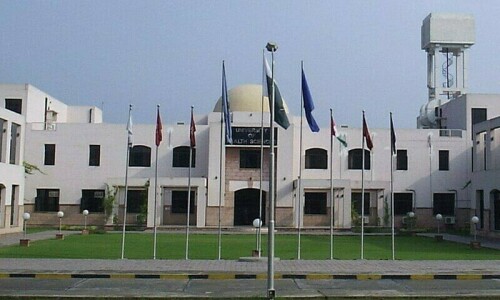LAHORE: Poet Zahid Dar passed away here in Lahore. He was 84.
Though he was suffering from health issues related to old age, cardiac arrest seemed to be the cause of death, said his friend Abdullah. He said they took Dar to hospital but doctors declared him dead.
Three books of Dar’s poetry, Dard Ka Shehr (1964), Mahabbat Aur Mayoosi Ki Nazmain and Tanhai have been published. A selection of his poems, titled Aankh Mein Samandar, was published in Delhi in 1987.
Dar was born in 1937 in Ludhiana. During a chit-chat with this writer at the Readings in Gulberg, he said, “I was born in Ludhiana in October 1937 but my brother gave the date of 1936 in my official records when the national identity cards were first introduced. My father was a diehard socialist. He had no profession or anything like that. He was arrested in the 1940s but died even before his release”.
In an interview with Altaf Ahmed Qureshi, published in the book, Adabi Muqalme, Dar says he was studying in Civil Lines School in Ludhiana when his family migrated to Pakistan in September 1947. He did his matriculation from the Islamia High School Bhati Gate. He enrolled in FA at the Govt College where he became friends with Safdar Mir, Anis Nagi and Sikandar Shaheen. He sat the exam but failed.
Dar crossed the border illegally to reach Ludhiana once in 1954 after getting fed up of the studies and came back to Lahore after two weeks stay with a Sikh school friend. However, he was caught by Pakistan forces on the border and faced a trial on espionage charge.
He joined the Food Department as a clerk in 1957 but left the job after sometime. He did some odd jobs in Karachi and came back to Lahore. According to his own accounts, he started writing poetry early in his life. His first published poem, Beemar Larka, appeared in a journal in 1957. He started writing a diary and titled it as Beemar Aadmi Ki Diary inspired by the Notes from the Underground by Dostoyevsky. Safdar Mir saw his diary written from 1957 and 1960 and called the notes as poems. He published the same poems in Saat Rung of Hasan Askari under the pseudonym of Madhu. Later, these poems were published in 1964 in his book, Dard Ka Shehr.
In his preface of Dard Ka Shehr, Jilani Kamran writes, “Zahid Dar’s poetry halts at the discovery of experience. Taking experience as a blessing, it opts for obsession, which saves the poet from suicide. When there is no risk of suicide, then the poet looks at his surroundings in such as a way as strangers look at new cities”.
In the preface to the Aankh Mein Samandar, Shamim Hanfi writes about life and works of Dar, “Zahid Dar is an outsider, not only in poetry but in day-to-day life also. Apparently, he looks indifferent to every matter of the world but this state of indifference in the life of any sane person does not appear without a deep experience of human interaction. The indifference of Zahid Dar gives the constant impression of human contact, weariness of love and his ideas originating from his sad life”.
Intizar Husain had written a sketch of him titled Faltoo Aadmi.
Dar did not marry. When asked why he did not get married, he said, “The women who came in my life wanted me to do some proper work, which was always against my nature”.
Zahid Dar’s journey in literature started at the Pak Tea House during his student life where he remained a constant presence along the stalwarts like Intizar Husain, Nasir Kazmi, Anis Nagi, Envar Sajjad and Ahmed Mushtaq. Before the pandemic and lockdown, he was frequently found at the Readings in Gulberg. He remained close to Intizar Husain until his death. After Husain’s death in 2016, he would spend whole days at the Readings. He was supported by his sister and was also taken care of by Abdullah. His brother Hamid Dar, a former professor of Economics at the GCU, financially supported him until his death in 2018. However, he kept getting support by his sister who was settled in England.
In the last years of his life, he was living as a paying guest with a family in Model Town flats where he breathed his last on Friday night. Funeral prayers for him were offered at Q Block, Model Town and he was laid to rest in the graveyard of the locality. Many literati of the city, including Asim Butt, Harris Khalique, Amjad Tufail, Shoaib bin Aziz and Nayyar Ali Dada, attended the funeral.
Published in Dawn, February 14th, 2021












































Dear visitor, the comments section is undergoing an overhaul and will return soon.